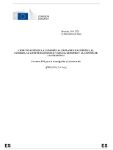European Research Area (ERA)
The European Research Area (ERA) was launched in 2000 as part of the Lisbon Strategy to address the fragmentation of the European Union's (EU) research and innovation system. It was created with the aim of overcoming the fragmentation and isolation of the national systems and reducing the disparities in their regulations and administrative frameworks.
Its objective is to strengthen the EU's scientific capacity and technological foundations by establishing a single market for research and innovation in which researchers, scientific knowledge and technology freely circulate. Through the ERA, the EU and its Member States strengthen their scientific and technological capacities, their competitiveness and their capacity to collectively address major challenges.
The ERA attracts the best talent to develop their research careers in Europe, develops a joint strategy for building and operating research infrastructure, encourages industry to invest more in European research and, ultimately, contributes to sustainable growth and job creation.
The ERA is a well-established, recognised political framework that promotes the synergies of European research and innovation policies and initiatives with national and regional ones, in line with the principle of subsidiarity and the autonomy of the funding agencies and research bodies.
Over the years, the EU has been updating the ERA agenda to strengthen each period's priorities. While major achievements have been reached in the development of the ERA, the current context requires a new approach that strengthens its mission as a common space for research and innovation. To this end, the European Commission launched a Communication on 30 September 2020 with a proposed plan for the new European Research and Innovation Area, which, as previously, will be focused on excellence, competitive, open and talented-focused and will improve the research and innovation landscape in Europe, but it incorporates the targets of accelerating the EU's transition to climate neutrality and digital leadership, supporting Europe's social and economic recovery following the coronavirus crisis and strengthening its resilience to new crises.
4 priorities have been identified for this new ERA:
- Prioritise investments and reforms in research and innovation towards the ecological and digital transition.
- Improve access to high-quality facilities and infrastructure for researchers across the EU.
- Transfer results: promote business investments and market assimilation of research results, and promote the EU's competitiveness and leadership in the global technological environment.
- Reinforce the mobility of researchers and the free circulation of knowledge and technology through greater cooperation between Member States.

